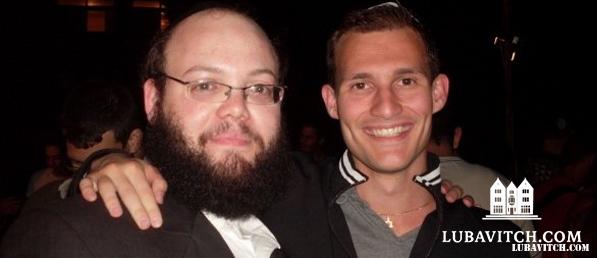(lubavitch.com) At Tel Aviv University, future doctor Jordana Hikri was experiencing a classic Israeli paradox.
Hikri spent her undergraduate years at Dartmouth, where the Jewish student population barely fills two school buses. Yet Jewish life on campus was active, and her calendar was booked with Shabbat dinners, holiday celebrations, and Jewish events. In Tel Aviv, Friday night is for clubbing.
“I was very involved with Chabad at Dartmouth, says Hikri, who found herself missing Rabbi Moshe Leib and Chani Gray of Chabad at Dartmouth. She missed their kids and the intellectual atmosphere around their Shabbat table.
“Israel can be a challenge spiritually. Everyone is Jewish, and people take it for granted. The rituals they are used to every week are no longer practiced except by those who are religious.”
But when her boyfriend introduced her to Chabad at Tel Aviv University, Friday night was Shabbat again.
Chabad on Campus representatives at TAU, Rabbi (Shay) Yeshayahu and Chava Gerlitzky, have been welcoming students to their Shabbat table every week for three years now. Many of their guests are American students studying at TAU hoping to recreate their Chabad-on-Campus experiences while in Israel.
“They remember the warmth so fondly. They miss their Chabad family,” said Rabbi Gerlitzky. Of the 80 students around the Shabbat tables at the beginning of this semester, he estimated 50% attended because of their positive experiences with Chabad at their home universities.
Jeremy Dery, president of Chabad at TAU’s overseas student activities, posts ads about Chabad’s Shabbat dinners on three bulletin boards in the Carter Building, the home base for overseas students, and at Einstein dorms, where nearly all overseas students live.
“Almost everyone I know went to Chabad on campus in the States,” he said. “Until they know Chabad is here, they are a little depressed. They don’t know what they are going to do for the holidays.”
Most overseas students do not have family in Israel, and TAU does not offer holiday programming. Ariel Ben Solomon, who attended universities in Wisconsin and Switzerland prior to coming to Israel said that Chabad at TAU “is the only option for doing Shabbat if you’re staying in the dorm for the weekend.”
At the Gerlitzkys’ Shabbat table, students are exposed to a traditional Shabbat with an Israeli twist. Both Gerlitzkys speak English, and their children are crowd pleasers. The menu is more Mediterranean than the stateside equivalent, with more hummus and olives, more fish, and more spices in the food. Apart from that, say students who have spent Shabbat with Chabad on campus in the U.S., the experiences share hallmarks of warmth and good conversation.
Orly Zaguri, a native Israeli, breaks from her architecture studies to spend Friday night with Chabad. She finds that most American students want to know Israeli slang, and she obliges, teaching them “sababa” and “magniv,” both variations on cool. Meeting a new crew of students every semester helps Zaguri see the charms of her challenging country anew.
After Shabbat ends, student come away with more than full bellies and happy memories. Rabbi Gerlitzsky officiated at Ariel Ben Solomon’s wedding six months ago. Now, the Solomons are building their lives with memories of Shabbat with Chabad.
“Rabbi Shay creates a lively atmosphere. I learned how to do Shabbat and the major holidays from him, and he made it attractive. Now we do Shabbat in our home.”

Be the first to write a comment.